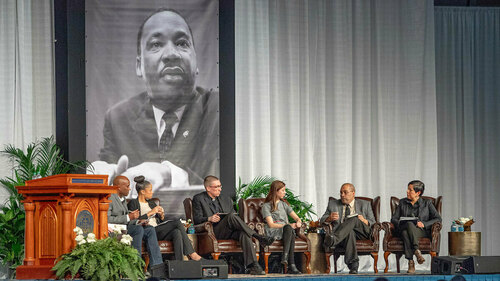
Walk the Walk Week at the University of Notre Dame continued Monday (Jan. 21), Martin Luther King Jr. Day, with an MLK Celebration Luncheon at the Joyce Center.
Sponsored by the Office of the President and the Oversight Committee on Diversity and Inclusion, the luncheon included remarks from Notre Dame President Rev. John I. Jenkins, C.S.C., as well as a panel discussion on race: “A Call to Love: Bridging the Racial Divide.”
Classes were canceled midday Monday so that students, faculty and staff could attend the luncheon. Those who could not attend were invited to gather in the dining halls for community building.
Now in its fourth year, Walk the Walk Week offers students, faculty and staff, as well as the community at large, the opportunity to celebrate the diversity that exists on campus and to reflect on ways to make Notre Dame even more welcoming and inclusive.
Laura Carlson, vice president, associate provost and dean of the Graduate School, emceed the event and offered welcoming remarks, calling on students, faculty and staff to “send up a collective voice of defiance against any and all forms of discrimination.”
Muhammad Abubakar Mian, president of the Muslim Student Association at Notre Dame, delivered the invocation. Karla Gonzalez Serrano, doctoral candidate in the Department of Electrical Engineering, delivered the benediction.
Father Jenkins, in his remarks, reflected on King’s early years, including his time at Morehouse College and Crozer Theological Seminary, noting that most of his formation as a transformative civil rights leader took place during his college and postgraduate studies. He described how during that time, King became convinced that “intellectual excellence could be combined with preaching and the pastoral roles,” and thus Christianity could be a force for positive social change.
“All of us, students, faculty and staff, should be reminded of how powerfully King’s years as an undergraduate and graduate student planted the seeds for a life in pursuit of justice that had such an impact on our nation and our society,” Father Jenkins said, adding, “Today is the day we reflect on our calling in this regard.”
The panel discussion featured moderator Jennifer Mason McAward, director of the Klau Center for Civil and Human Rights and associate professor of law; Rev. Pete McCormick, C.S.C., director of Campus Ministry; Ernest Morrell, director of the Center for Literacy Education, Coyle Professor of Literacy Education and professor of English and Africana studies; Alyssa Ngo, class of 2019; Rev. Hugh Page Jr., vice president, associate provost, dean of first year of studies and professor of theology and Africana studies; Maria Tomasula, Michael P. Grace Professor of Art; and Cameasha Turner, doctor of jurisprudence, third year.
Replying to a question about the appropriate response to racism, Page said, “If you take the lead of Dr. King and embrace the idea of a commitment to love and a commitment to justice, that really is a demanding call that requires both soul searching and truth telling. Dr. King’s own reading of the prophetic tradition in the Hebrew Bible actually led him, I think, to understand that this required the ability to see clearly, to understand how structures work and what’s necessary to dismantle and transform them. It also required what might be termed, if you look at his own interactions with the black church and with clergy outside the black church, a kind of unholy patience.”
Other topics of discussion included the distinction between racism and bigotry, white privilege, political correctness, “reverse racism,” love as a response to racism and diversity and inclusion on campus, including the recent inclusive campus student survey.
Despite many challenges, the panelists expressed hope for the future.
“My students give me hope,” said Tomasula. “When we have conversations in the classroom, I leave very often filled with joy. What they reveal about how they see the world and how they want the world to change and how they want to take their education at Notre Dame out into the world, that gives me hope.”
Ngo spoke of the individual power to change.
“You are in control of your own actions, your own heart, your own mind,” she said. “So that gives me hope that every single one of us in this room, no matter where you’re from or how you grew up or what you were taught, you can transcend that and become your own person. So ask yourself, what kind of person do I want to be and what are the steps that I can take to get there?”
Walk the Walk Week continues through Saturday, with events including lectures, discussions, a unity summit, a social concerns fair and artist receptions.
For more information, visit https://diversity.nd.edu/mlk.